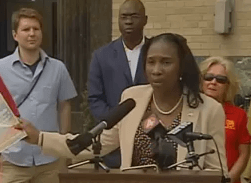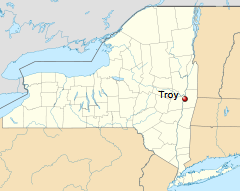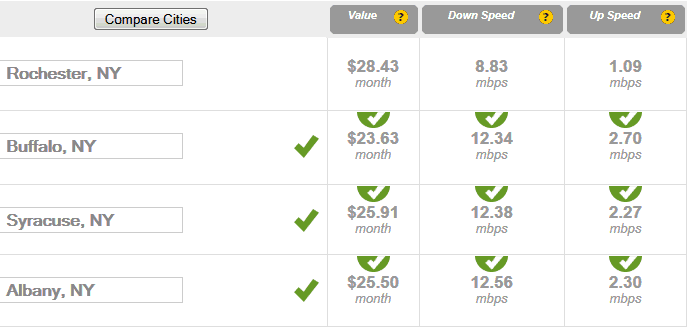 Buffalo’s communications labor unions are behind an organized effort to push Verizon Communications to expand its fiber-to-the-home service to the city of Buffalo, despite the fact the telecom company has a moratorium on service expansion beyond its existing commitments.
Buffalo’s communications labor unions are behind an organized effort to push Verizon Communications to expand its fiber-to-the-home service to the city of Buffalo, despite the fact the telecom company has a moratorium on service expansion beyond its existing commitments.
Buffalo AFL-CIO Central Labor Council President Michael Hoffert and CWA (Communications Workers of America) Local 1122 President James Wagner teamed up with the city’s elected officials and community advocates to pressure the phone company to expand service beyond several suburbs that currently get the service.
A professionally designed website, DontBypassBuffalo.com, is the home of the campaign, collecting signatures from interested residents and sharing late-breaking developments.
“Verizon’s FiOS service is a cutting-edge technology that brings ultra-fast internet and superior video programming over fiber optic cables that run directly into customers’ homes,” reads a statement from the coalition. “While Verizon is deploying FiOS throughout many of the suburbs of Buffalo, they are not building FiOS in the City of Buffalo. The residents of Amherst, Tonawanda, Kenmore, Orchard Park, Hamburg, West Seneca and Lackawanna, where Verizon has built FiOS, are, taken as a whole, more affluent and less diverse than Buffalo residents. The deployment of broadband technologies is a key to economic redevelopment in the City, especially since health care and higher education, both very dependent on cutting edge technologies, are leading employers in our area. If Verizon continues to bypass Buffalo, residential consumers, children, and area businesses won’t be able to thrive in the 21st century economy.”
The union shares an interest in bringing the advanced service to more residents across Erie County as it collectively represents some of the Verizon employees who will service the fiber network. Three western New York chapters of the CWA – Locals 1122, 1115 and 1177 – represent nearly 750 Verizon Workers across Erie, Genesee and Niagara counties, as well as across the Southern Tier, including field technicians, central office technicians and clerical staff.
Verizon stalled new rollouts of its fiber optic network more than a year ago, and has consistently said it would only expand service in areas where it already has signed agreements with local communities. In many regions, Verizon has completed agreements with towns and villages before reaching accommodations with larger urban areas. Buffalo is not alone in protesting for improved broadband service. Washington, D.C., Baltimore and Boston have also complained about being bypassed.
Last week, Coalition Director Janique Curry stepped up the pressure on the phone company at a press conference in front of Verizon’s Elmwood Avenue headquarters.
“Verizon’s lack of commitment to the minority population in the city of Buffalo is unacceptable,” Curry said. “This community deserves an equal opportunity as our neighbors in the suburbs experience.”
Verizon’s FiOS network in New York State currently serves parts of metropolitan New York City and suburban areas around Albany, Syracuse, and Buffalo.
[flv width=”640″ height=”500″]http://www.phillipdampier.com/video/DontBypassBuffalo Apr-May 2011.flv[/flv]
Here are three reports on the protests: WIVB-TV and WKBW-TV’s coverage of the protest in April, and WIVB’s most recent story covering last week’s return to Verizon headquarters to apply additional pressure on the company. (3 minutes)


 Subscribe
Subscribe








